Isolation, quarantine, antigen, RT-PCR as COVID tsunami strikes
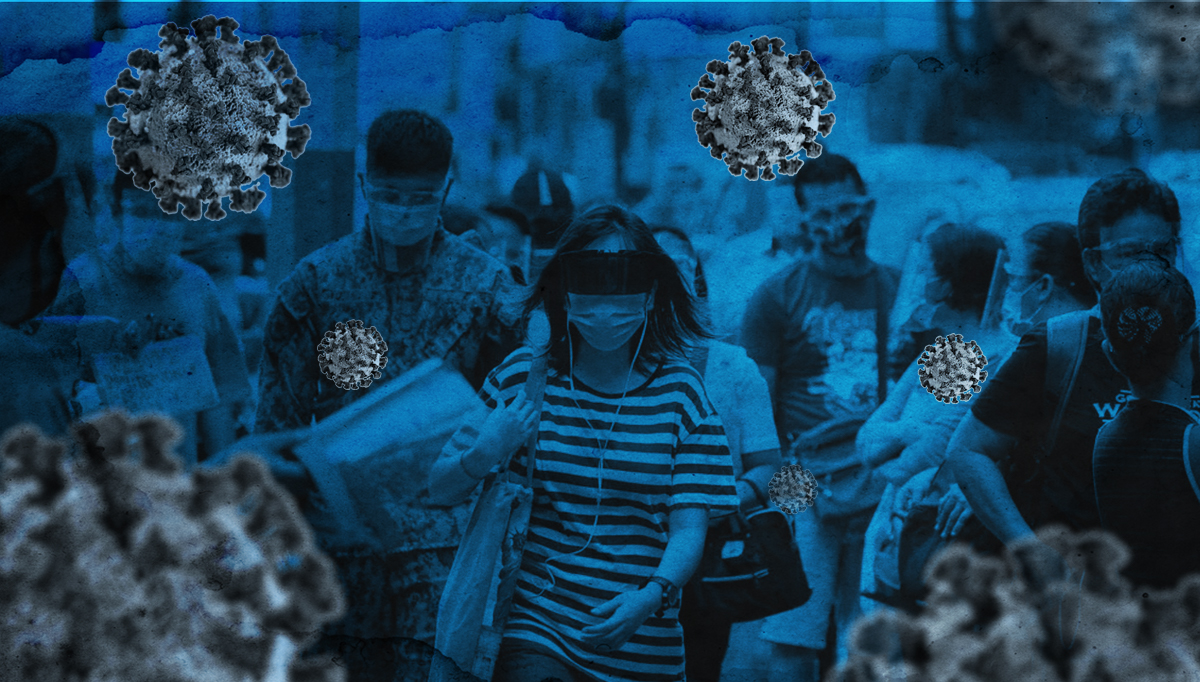
FILE PHOTO
MANILA, Philippines—Following the holiday season, many Filipinos reported feeling sick amid the flu season, the sudden spike of coronavirus infections and the threat of the highly transmissible Omicron variant.
In this article, INQUIRER.net will list the difference between isolation and quarantine, both of which are important in controlling the spread of disease—especially among those who have been experiencing flu and COVID-like symptoms.
This article will also try to explain more about antigen COVID tests and home testing.
Isolation vs quarantine
Regular flu symptoms, according to United States Centers for Disease Control and Prevention (CDC), include fever, cough, sore throat, body pains, fatigue and others—most of which are likewise considered as COVID-19 symptoms, according to the World Health Organization (WHO).
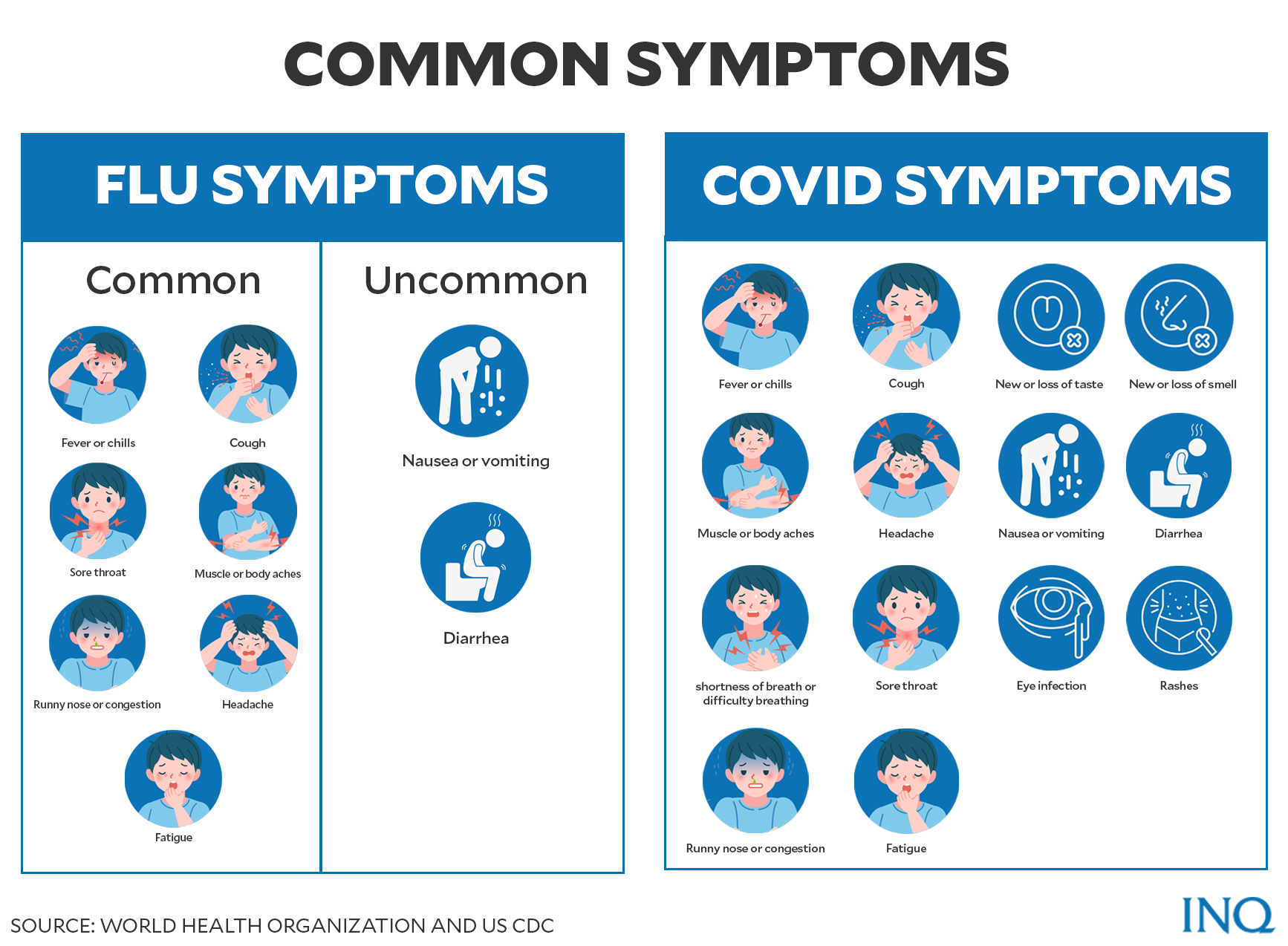
Graphic by Ed Lustan
The Department of Health (DOH) has recently explained that it was difficult to identify whether a person has flu or contracted SARS-CoV-2, the virus that causes COVID-19, based on the symptoms alone.
Dr. Anna Ong-Lim, a pediatric infectious disease specialist, urged people to isolate themselves immediately if they develop possible COVID symptoms.
“When the symptoms begin to show, however mild it is, our response should be to isolate because the interval of infections is very short,” she said in a statement.
“Within two days or so, there would be another infection inside the cluster. There is no time to have second thoughts and confirm their symptoms to decide whether it is COVID-19 or not,” she added.
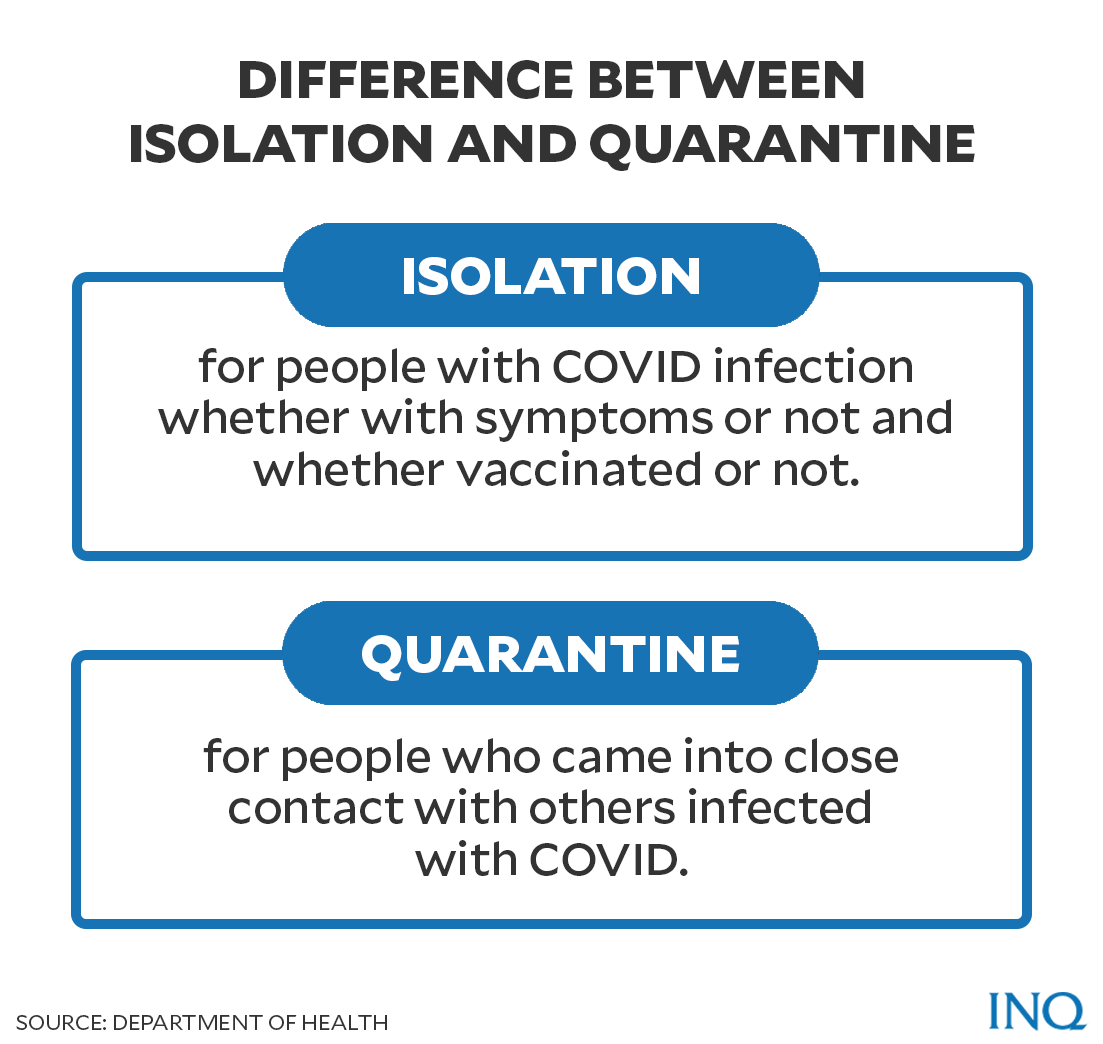
Graphic by Daniella Marie Agacer
But what is the difference between isolation and quarantine? For how long should people isolate or be under quarantine?
DOH explained that people who have been infected and tested positive for coronavirus—whether with our without symptoms or vaccinated or unvaccinated—are required to isolate.

Graphic by Daniella Marie Agacer
Quarantine, on the other hand, is required for individuals who have been exposed or came into close contact with COVID-19 patients and can possibly develop an infection.
The health department has issued a guideline for isolation and quarantine for the general population:
• Fully vaccinated, partially vaccinated and unvaccinated individuals who have tested positive for COVID-19—whether without or with symptoms—must isolate for 10 days or on the advice of their doctor.
• Fully vaccinated, partially vaccinated and unvaccinated individuals who have tested positive for coronavirus and have severe and critical symptoms must be isolated for 21 days or on the advice of their doctor.
• Vaccinated people who came into close contact with COVID-infected individuals must be on quarantine for seven days or on the advice of their doctor.
• People with partial or no vaccination must quarantine for 14 days or on the advice of their doctor if they come into close contact with COVID-infected individuals.
The separate guideline on isolation and quarantine for health care workers (HCWs) was also released by the health department.
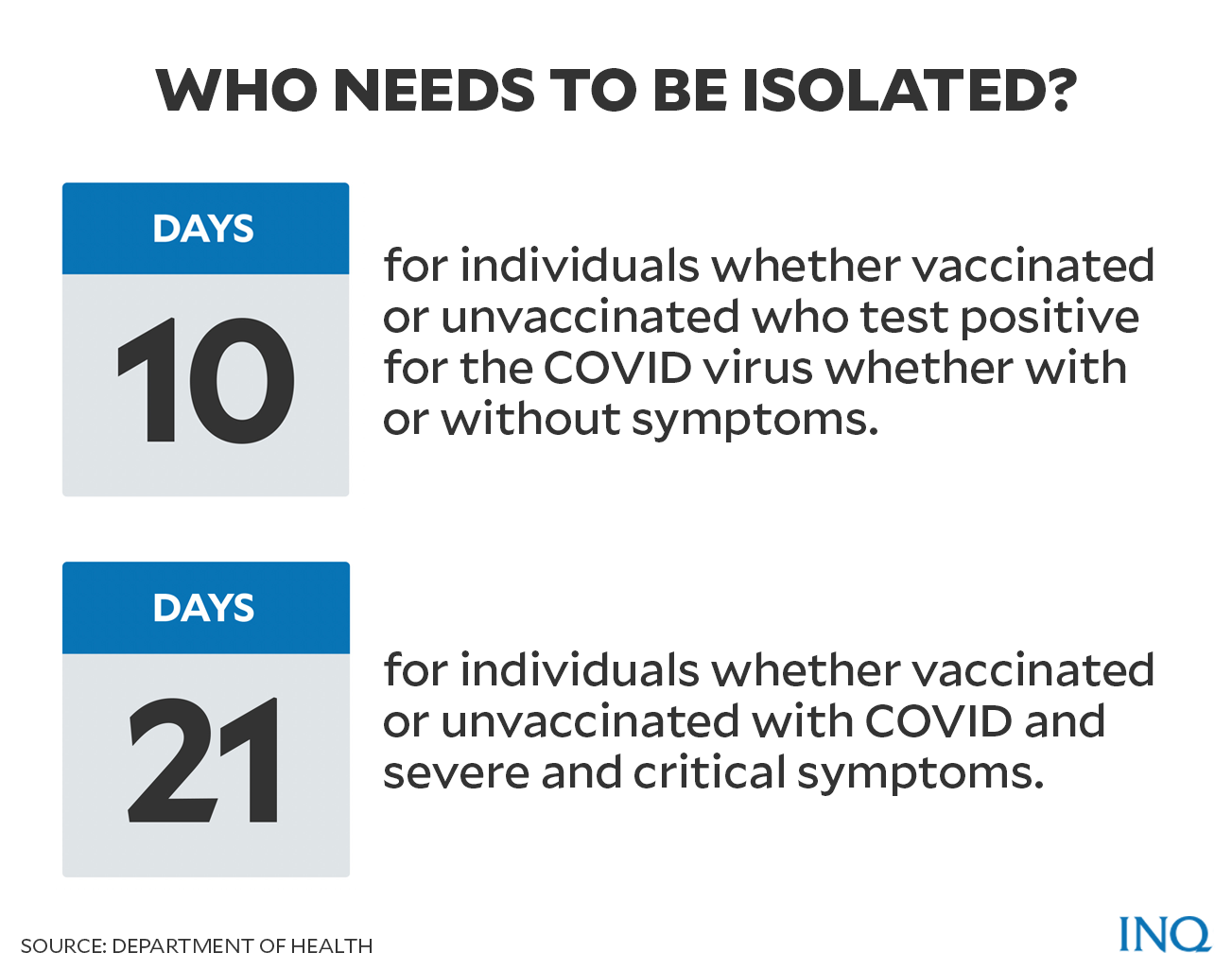
Graphic by Daniella Marie Agacer
“Hospital Infection Prevention and Control Committees and Provincial Health Officers are authorized to shorten duration of isolation and quarantine of fully-vaccinated health workers in consideration of their health care capacity,” said the DOH, following the CDC Interim Guidance for Managing Health Care Personnel with SARS-CoV-2 Infection or Exposure to SARS-CoV-2.
The current isolation period for health workers, who tested positive for COVID whether with or without symptoms, is 10 days, while the shortened protocol requires isolation for up to five days only.
The current quarantine period of health care workers who are close contacts of COVID-infected individuals is at least seven days. The shortened protocol, meanwhile, recommends no quarantine for these health care workers.
Using antigen tests
RT-PCR (reverse transcription-polymerase chain reaction) tests are considered the gold standard in detecting SARS Cov2 infection.
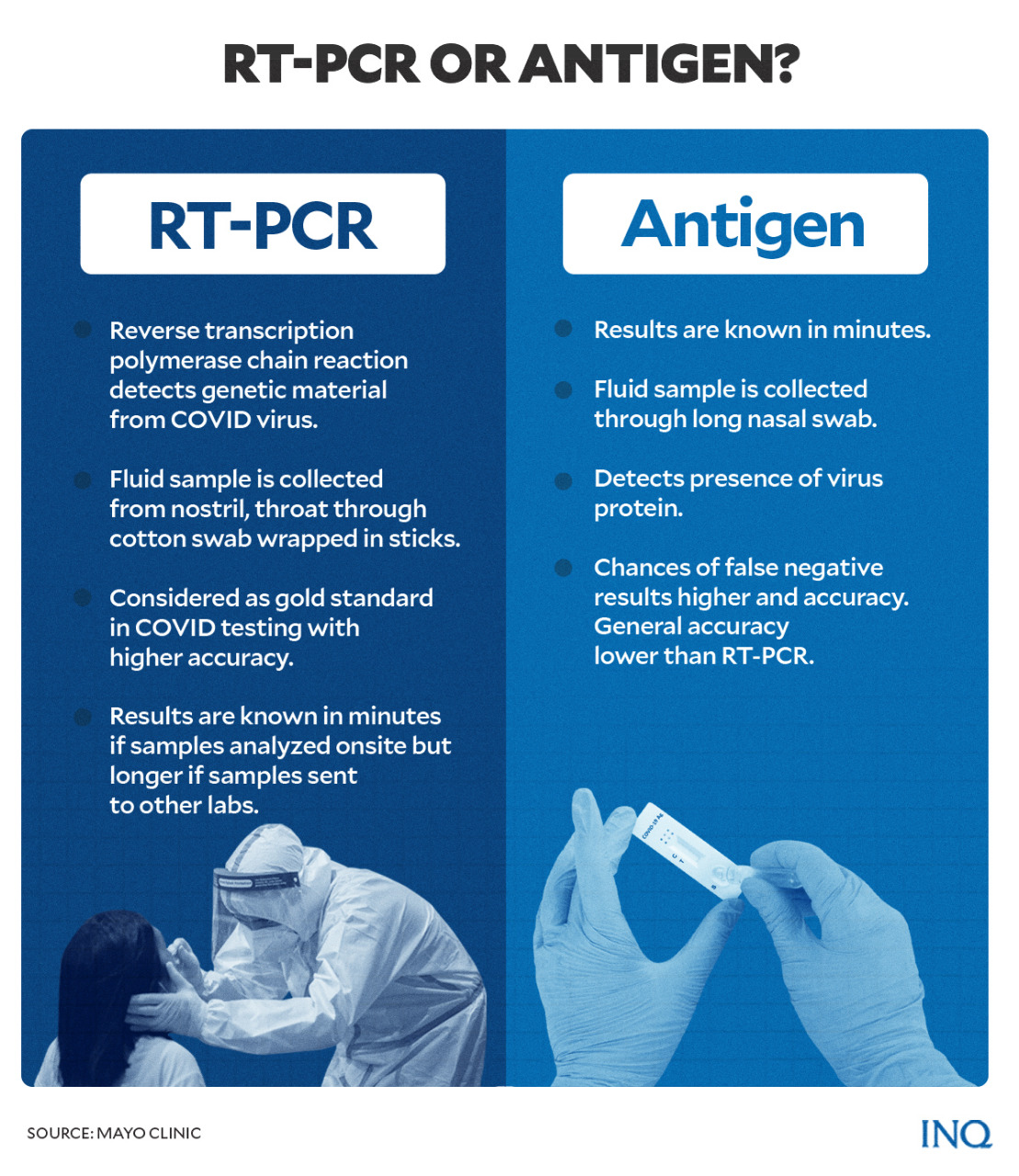
Graphic by Daniella Marie Agacer
On the other hand, the faster alternative is the rapid antigen test, which detects antigens or toxins that trigger an immune system response when entering the body.
According to DOH, antigen tests “work best on symptomatic patients.”
So, how do you interpret antigen tests and what should you do based on the test results?
According to guidelines issued by DOH, symptomatic individuals with:
• a positive antigen test result must isolate immediately as they are highly likely positive for COVID-19
• a negative antigen test result must isolate immediately and get RT-PCR test
Those who are exposed to COVID-19 cases but without symptoms but with:
• a positive antigen test result are likely COVID-19 positive and must isolate immediately
• a negative antigen test result must quarantine first and test with RT-PCR on the fifth day of their exposure
Those who are not exposed but are experiencing symptoms:
• if they have a positive antigen test result, they must immediately isolate and consult with a health care professional
• if they have a negative antigen test result, they must follow safety protocols such as wearing face masks, frequent hand washing, and limiting contact with other people
Considering home testing?
According to the DOH, there are two types of antigen tests. These include antigen tests that are administered by qualified health workers who undergo training to get correct sample and those found in self-test kits which are easy to use and are “designed for laypersons.”
On Jan. 7, however, the health department clarified that no self-administered antigen test kit has been registered with the Food and Drug Administration (FDA), despite its availability online.
READ: DOH says no self-administered antigen test kit has been registered with FDA
According to Health Secretary Francisco Duque III, the self-administered antigen kits sold online are most likely counterfeit and smuggled.
“It is most likely not approved that’s why you should not just buy these items. I have instructed the FDA to investigate these and to check if these were products that have secured Certificate of Product Registration (CPR),” he said.
“If the product does not have a CPR, it is most likely smuggled. I think this is also being investigated by the NBI (National Bureau of Investigation),” he added.
READ: Duque cautions public on use of COVID-19 home test kits sans FDA approval
As of Jan. 11, two manufacturers of self-administered home test kits for COVID have applied for special certification by the FDA.
READ: 2 makers of home test kits for COVID-19 have applied for special certification – FDA chief
According to DOH, COVID antigen tests that are FDA-registered and administered by health workers are recommended and are best for home swabbing services, instead of self-administered kits that are being sold online.
“Antigen tests designed for health workers usually need nasopharyngeal swab which is difficult to do. If untrained but using kits designed for health workers, it is likely that your results will be inaccurate,” the DOH said.
“Wrong swab=wrong result=false sense of security,” it added.
TSB
For more news about the novel coronavirus click here.
What you need to know about Coronavirus.
For more information on COVID-19, call the DOH Hotline: (02) 86517800 local 1149/1150.
The Inquirer Foundation supports our healthcare frontliners and is still accepting cash donations to be deposited at Banco de Oro (BDO) current account #007960018860 or donate through PayMaya using this link.














